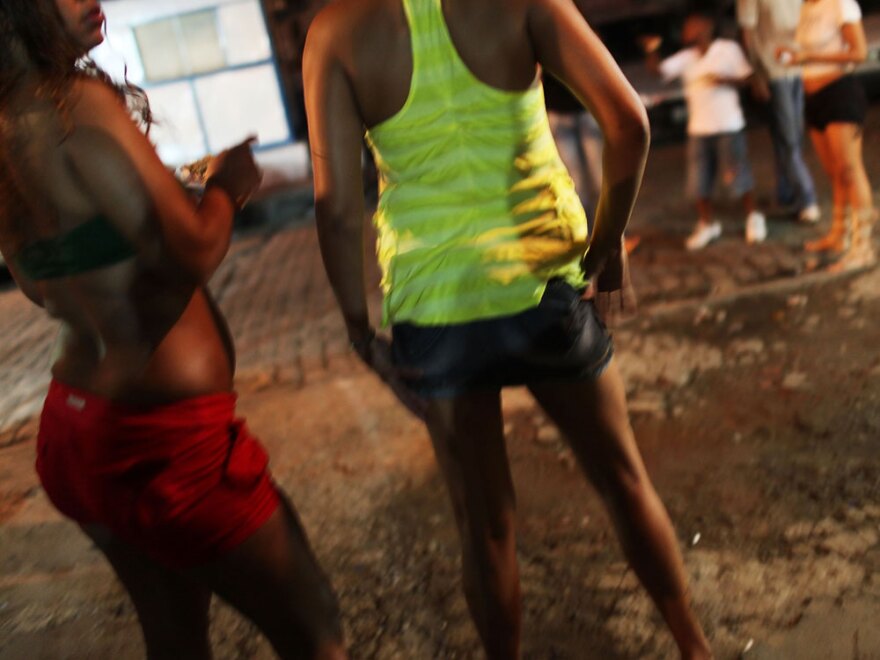Prostitution is ambiguous in Brazil — it's not totally legal, or, illegal.
The tropical city of Rio de Janeiro has been trying to clean up its image as a place filled with drugs, violence and prostitution in an effort to strengthen its position as a global economic power and as it prepares to host the World Cup and the Olympics.
More than a few travelers come to Rio imagining impromptu samba, miles of palm trees and sunny beaches — and prostitution.
For better or worse, Rio has a reputation for sexual tourism. The sex industry caters to locals and foreigners alike, and sex work can be anything from call girls who charge thousands of dollars a night to shuttered downtown brothels.
At one particular brothel, a little over $10 buys 15 minutes of sex in a cubicle cooled by a tired fan.
Milena, who goes only by her first name, is 27 years old. She wears a bikini top, ruffled underwear, and platform heels — and has the same attitude a cashier wearing an apron and sneakers might have.
She's trained as a health technician but says each month she makes about four times a health technician's salary by turning tricks.
"I can't complain; I earn money to live off of," she says. "Is it safe? No. Sex work isn't safe for anyone. But I pay the bills. This is something you do to pay your bills."
Milena says that's why, for now, she's choosing prostitution. One day she hopes to find a job as a health technician, with benefits and a competitive salary.
All over the world, prostitution is looked down upon or flat-out rejected for many reasons — not least of which is that sex work can mean human trafficking, or even child prostitution.
I can't complain; I earn money to live off of. Is it safe? No. Sex work isn't safe for anyone. But I pay the bills. This is something you do to pay your bills.
But anthropologist Thaddeus Blanchette says his research tells another story: In Rio, the vast majority of sex workers are like Milena, adults who have had other jobs and freely choose prostitution because it pays so well. They are former maids, cooks, store clerks — even interns.
"They have to spend a year, maybe two, in a free internship after they leave university in order to get a good job in a profession," he says. "And there are a lot of men and women who turn tricks to make ends meet during that internship as well. So it's a very diverse group."
Rio's current mayor, Eduardo Paes, has spoken out against regulating prostitution. And the arrival of high-speed rail from Sao Paulo to Rio would very likely level the city's current red light district, Vila Mimosa.
Architect Guilherme Ripardo is working with local prostitutes to design a new space.
"The mentality in Rio is to keep sex work hidden," he says. "But today, the world is a lot more open about sex, so I don't think we should be hiding it. It's important to show that prostitution is something that happens, and it's not necessarily a problem."
Right now the red light district is away from the safe bustle of downtown, a few decrepit industrial blocks filled with loitering men. Many are drinking beer, surveying any woman who passes with a mix of interest, vague hostility and boredom. The main venue is a large, abandoned warehouse, a warren of mini-brothels, live sex shows, and shops that sell everything from lingerie and incense to cheeseburgers.
Leonardo, who also gives only a first name, is the manager of one of the larger brothels. Inside, some women chat and eat before work. Leonardo is worried that soon they'll have to move out of this neighborhood.
"If we have to go, everyone will go together," he says. "Just keep on working somewhere else."
But no people seem eager to have prostitution in their neighborhood. Andres Luis is a bellhop at an upscale hotel in Copacabana. A dance club known as pickup spot for prostitutes used to be nearby, until the city shut it down last year.
"Now it's a lot better at night," he says. "There was a lot of prostitution; it spilled out into the street and nearby restaurants. For families who came here, it was hard. Hopefully prostitution isn't going to return."
But Luis also says he believes that prostitution is impossible to control, anywhere, especially during international events like Carnival, the Olympics or the World Cup.
According to 59-year-old former prostitute and activist Gabriela Leite, the key to controlling prostitution is keeping it out in the open.
"It has to be out in the world," she says. "Nothing confined. In addition to being hypocritical, confinement means more exploitation because then it's hidden and that means more violation of human rights. You shouldn't hide prostitution just so that proper society won't see it."
Copyright 2020 NPR. To see more, visit https://www.npr.org. 9(MDAxNDQ2NDAxMDEyNzU2NzM2ODA3ZGI1ZA001))



